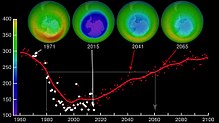Mario Molina | |
|---|---|
 Molina in 2011 | |
| Born | Mario José Molina Henríquez 19 March 1943 Mexico City, Mexico |
| Died | 7 October 2020 (aged 77) Mexico City, Mexico |
| Education | |
| Spouses |
|
| Awards | See list
|
| Scientific career | |
| Fields | Chemistry |
| Institutions | |
| Thesis | Vibrational Populations Through Chemical Laser Studies: Theoretical and Experimental Extensions of the Equal-gain Technique (1972) |
| Doctoral advisor | George C. Pimentel |
| Doctoral students | Renyi Zhang |
| Website | Official website |
| External audio | |
|---|---|
 | |
Mario José Molina-Pasquel Henríquez[a] (19 March 1943 – 7 October 2020)[7] was a Mexican physical chemist. He played a pivotal role in the discovery of the Antarctic ozone hole, and was a co-recipient of the 1995 Nobel Prize in Chemistry for his role in discovering the threat to the Earth's ozone layer from chlorofluorocarbon (CFC) gases. He was the first Mexican-born scientist to receive a Nobel Prize in Chemistry and the third Mexican-born person to receive a Nobel prize.[8][9][10]
In his career, Molina held research and teaching positions at University of California, Irvine, California Institute of Technology, Massachusetts Institute of Technology, University of California, San Diego, and the Center for Atmospheric Sciences at the Scripps Institution of Oceanography. Molina was also Director of the Mario Molina Center for Energy and Environment in Mexico City. Molina was a climate policy advisor to the President of Mexico, Enrique Peña Nieto.[11]
- ^ Massachusetts Institute of Technology (11 October 1995). "MIT's Mario Molina wins Nobel Prize in chemistry for discovery of ozone depletion". Archived from the original on 26 December 2018. Retrieved 31 May 2008.
- ^ "The Heinz Awards, Mario Molina profile". Archived from the original on 22 October 2015. Retrieved 22 September 2009.
- ^ "Volvo Environment Prize". Archived from the original on 9 November 2017. Retrieved 8 October 2020.
- ^ "President Obama Names Presidential Medal of Freedom Recipients". Office of the Press Secretary, The White House. 8 August 2013. Archived from the original on 26 December 2018. Retrieved 9 August 2013.
- ^ Cite error: The named reference
OHwas invoked but never defined (see the help page). - ^ Cite error: The named reference
Interviewwas invoked but never defined (see the help page). - ^ "Mario Molina, Mexico chemistry Nobel winner, dies at 77". ABC News (USA). Associated Press. 7 October 2020. Archived from the original on 8 October 2020. Retrieved 8 October 2020.
- ^ "Mario Molina, ganador del Premio Nobel 1995, muere a causa de un infarto". El Universal (in Spanish). 7 October 2020. Archived from the original on 8 October 2020. Retrieved 10 March 2021.
- ^ García Hernández, Arturo (12 October 1995). "Ojalá que mi premio estimule la investigación en México". La Jornada (in Spanish). Archived from the original on 16 September 2009. Retrieved 29 September 2009.
Mario Molina, primer mexicano que obtiene el premio Nobel de Química...
- ^ "Mario Molina | Inside Science". Visionlearning. Archived from the original on 9 June 2020. Retrieved 8 October 2020.
- ^ Davenport, Coral (27 May 2014). "Governments Await Obama's Move on Carbon to Gauge U.S. Climate Efforts". The New York Times. ISSN 0362-4331. Archived from the original on 8 October 2020. Retrieved 17 February 2022.
Cite error: There are <ref group=lower-alpha> tags or {{efn}} templates on this page, but the references will not show without a {{reflist|group=lower-alpha}} template or {{notelist}} template (see the help page).